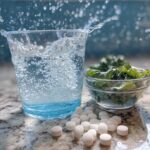Description
Understand the connection between calcium supplements and kidney stones. Learn how dietary calcium may prevent stones, why sodium is a bigger culprit, and the importance of hydration.
Ingredients
- Calcium supplements (if recommended by a doctor)
- Water
- Foods rich in calcium (e.g., dairy, leafy greens)
- Foods low in sodium
- Foods low in oxalates (e.g., berries, cauliflower)
Instructions
- Consult with a healthcare professional before starting any calcium supplement regimen, especially if you have a history of kidney stones.
- Prioritize obtaining calcium from dietary sources such as milk, yogurt, cheese, and leafy green vegetables.
- Ensure adequate daily intake of calcium to potentially reduce the risk of kidney stone formation.
- Maintain good hydration by drinking plenty of water throughout the day.
- Limit your intake of sodium (salt) as a high sodium diet is often linked to an increased risk of kidney stones.
- Be mindful of oxalate intake, as calcium binds with oxalates to form stones, but understand that a balanced diet is key.
- Discuss with your doctor whether calcium supplements are appropriate for your specific kidney stone prevention strategy.
Notes
- Most kidney stones are made of calcium, but calcium itself is not usually the cause.
- Calcium binds with oxalates to form stones.
- Dietary calcium may protect against kidney stones.
- High sodium intake is a significant risk factor for kidney stones.
- Hydration is crucial for kidney stone prevention.
- Food-based calcium is generally preferred over supplements.
- Prep Time: 5 minutes
- Cook Time: 0 minutes
- Category: Health Information
- Method: Informational Article
- Cuisine: General
Nutrition
- Serving Size: N/A
- Calories: N/A
- Sugar: N/A
- Sodium: N/A
- Fat: N/A
- Saturated Fat: N/A
- Unsaturated Fat: N/A
- Trans Fat: N/A
- Carbohydrates: N/A
- Fiber: N/A
- Protein: N/A
- Cholesterol: N/A
